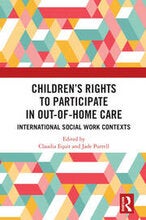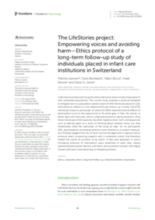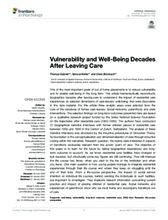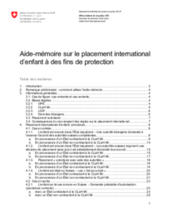Displaying 11 - 20 of 55
This volume covers a broad spectrum of current research findings concerning the participation of young people in foster families and residential living groups in Australia, Canada, Germany, Ireland, Italy, Portugal, Norway, Sweden, and Switzerland as well as cross-nationals perspective on children and young people’s participation in foster and residential care placements in Great Britain and France.

The current study assesses a protocol designed to mitigate risks in a population-based cohort of 246 individuals placed in care institutions as infants in a non-selective 60-year follow-up. In total, 116 (47%) individuals chose to participate, of whom 53 (55%) reported positive effects of participation such as the opportunity to fill some gaps in their life stories, to better deal with their past, and to understand previous family dynamics.
- Job no: 550724
- Contract type: Consultancy
- Duty Station: Geneva
- Level: Consultancy
- Location: Switzerland
The purpose of this consultancy is to develop a ready-to-use, easy-to-contextualize workshop package, including PowerPoints, checklists and tip-sheets, case studies, and videos, to support the application of Pillar 4 in the Minimum Standards for Child Protection in Humanitarian Action: Standards to Work Across Sectors. Sectors of focus will include Education, Health, Food Security, Camp Coordination and Camp Management, and Nutrition.
In a qualitative study in Switzerland, the authors of this article have conducted 37 narrative interviews with people who experienced residential care between 1950 and 1990. The analysis was based on a reconstructive life course perspective and grounded theory.
This article hermeneutically reconstructs biographies decades after leaving-care to understand the impact of residential care experiences on selected dimensions of care-leavers’ well-being, that were discovered in the data material.
The aim of the current paper is to examine the demographic, crime-related and psychosocial characteristics of child welfare and juvenile justice youths in shared residential care and subsequently examine its relationship with offending behavior in adulthood.
This study uses data from a survey on the health and development of 420 children mostly under the age of three, placed in 12 infant care institutions between 1958 and 1961 in Zurich, Switzerland. The children exhibited significant delays in cognitive, social, and motor development in the first years of life. Moreover, a follow-up of a subsample of 143 children about 10 years later revealed persistent difficulties, including depression, school related-problems, and stereotypes.
Cet aide-mémoire énonce le rôle des autorités compétentes (administratives ou judiciaires) et les fonctions qui leur sont dévolues selon les bases légales applicables en matière de placement international d’enfants à des fins de protection.
This study shows that, when researching historical compulsory social measures, the inclusion of formerly institutionalised individuals in development and implementation is not only feasible, but is of significant benefit to the quality of the research.





